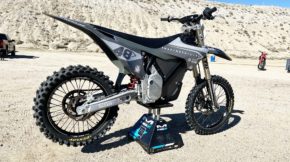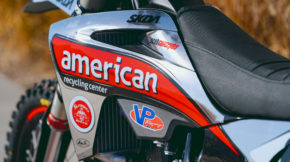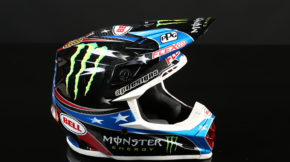2020 KTM SX-E 5 | Details Of The Electric Mini Bike
Share
2020 KTM SX-E 5 | COMPLETE CONTENT ARCHIVE
Earlier this year, KTM announced their plans to add a new electric-powered motorcycle to their model line, but in a much different way than what others have done in the past. Rather than pursue the already oversaturated market of full-size 250-450 models, the Austrian brand aimed their focus at bringing in new riders at the youngest age with a minibike that takes engineering cues from their incredibly popular 50 SX range. After months of anticipation, the KTM SX-E 5 was debuted to the public at the Red Bull Straight Rhythm, complete with two bikes set at various ride heights, a cutaway that offered a view of the battery pack and motor, and a small track where young KTM test riders carved laps for the public. In talking with Ryan Sarancha, one of the product management specialists at KTM, it became very clear that the group took note of past issues that arose when new technology is introduced to the market and will avoid the same situations with the SX-E 5 by educating consumers of the bike’s features and an already developed racing platform with the AMA. The KTM SX-E 5 is set to land at dealerships in November, just in time for the holidays and the next race season. As with anything new, there are many questions that the public will have before they decide to wheel a bike out of the showroom and into their garage, which Sarancha gladly answered.
Anyone that has bought a minibike in the past knows that some different tricks and products can change the ride height or power delivery to suit a young rider’s size and skill. Rather than rely on the aftermarket or backyard mechanics, KTM’s engineers addressed these areas in the design of the chassis and bodywork and the output of the motor, which allows the SX-E 5 to go from the size and power of the entry-level 50 SX Mini to the 50 SX. “This is a motorcycle that is perfect for pure beginner riders because they can grow and adapt with it through the adjustable seat height and power that is for a three to four-year-old up to a 10-year-old, when they are a seasoned mini rider,” explained Sarancha. “We can drop the seat height down to the size of the 50 SX Mini and then raise it to the height of the 50 SX. Aside from the six levels of seat height, we have six levels of power adjustment. You can take the bike down to the lowest seat height and make the power just faster than a walking pace, so a pure beginner can approach the bike and be comfortable on it as they learn to ride. Then you can take the power all the way up to level six and raise the seat height up to the 50 SX and do whatever you want, from racing to playing in the desert. It’s incredibly versatile in the way it covers all of the different usages. Instead of a parent buying two or three different motorcycles to get their kid into the sport, they are buying one motorcycle that will grow and adapt with them. That’s an incredible prospect.”
KTM’s designers paid close attention to the contact points on the SX-E 5 by fitting proportionality sized handlebars and grips, footpegs, and body panels to the chassis, all of which can be adapted as the rider grows. “Because we wanted the bike to be appropriate for pure beginners to the most experienced riders, we wanted to make sure the ergonomics were comfortable and confidence-inspiring. We looked at simple solutions, like the 18-millimeter bar-ends on the grips and five levels of adjustability on the handlebar height. Any rider will be comfortable with the way we have the bike setup,” shared Sarancha. “We have six different positions to mount the bodywork and suspension on the frame, and there is a lowering kit in the accessories catalog that gives another 50 millimeters of lowering. As a parent, that gives a tremendous amount of usability for a parent. If you have multiple kids at home, you have one bike that you can set up for one kid with the ride height and power delivery, and then take the same bike and set it up for another kid. It’s important to give parents those options so they see it’s a viable way.”
The pairing of the lithium-ion battery pack and the motor is by far the most important topic of the KTM SX-E 5. Developed by the e-mobility department at KTM’s headquarters in Mattighofen, Austria, the 48-volt engine is powered by 84 Li-ion cells that are securely stored in a diecast outer casing that protects it from the elements like dust and water. Anyone familiar with minibikes knows how tricky it can be to fine-tune the single speed, small cylinder engine and how much of a strain it puts on internal parts, but the new powerplant eliminates all of these issues. “Because it has an electric motor, you are not doing things like adjusting the carburetor or replacing pistons and clutches. You don’t have to know how to do any of that. The wear items become tires, sprockets, and chains while the one wear item on the motor, which is a bearing that rides on the driveshaft. Other than those simple things, you’re out there playing and having fun,” explained Sarancha.
And this could be the biggest selling point to consumers, especially those with less than stellar mechanical abilities or limited motorcycle experience. “We need people to enter the sport and get into racing. If this is their in-road, perfect. It has lowered a lot of barriers of entry for parents because they don’t have to buy a truck or all of the tools to support it. You can put this bike in the back of a minivan just as easily as you could the back of a truck because you don’t have the fumes from a gas can or the bike spilling fuel onto the floorboards,” Sarancha stated. “The first thought when you take a new product to market is how will you reach as many people as possible. With six different seat heights and power adjustments levels, we know that it will be brought to a wide range of riders, including potential new riders. It’s not as though we are saying this is just a beginner level bike or a race bike. It has the potential to be everything a young rider needs it to be with the adaptability that the bike has.”
With an MSRP of 5049-dollars, the SX-E 5 has a slightly higher entry cost than other models in the 50 SX line, something Sarancha said will even out quickly thanks to the reduced parts. “It’s only 700-dollars more than the 50 SX Mini and you’re getting a tremendous amount of technology. We’re very proud of the pricing for what we are bringing to the market. The cost of operation is so much lower, so you’ll be cost neutral in no time. If you are thinking about how it’s a couple of hundred dollars more to start, in a short amount of time you’ll make it up in money saved with replacement parts.”
The runtime of a battery pack is the most common question around electric motorcycles, as the duration largely depends on which power mode the bike is in. “We have one to two hours of ride time in the beginner mode and about 20 to 25-minutes when set to race pace, which is usually enough for any mini race. When the bike comes back to the pits, plug it into the generator or the outlet for about a half an hour and then send them out again,” said Sarancha. Yes, this is a change from the common routine of pull in, fill up the tank, and get back on the track, but it’s something that KTM feels people will adapt to in time. “It does take a little bit of reimagining to how you will play with the bike when you factor in the charge time, but there’s no refueling or mixing gas to worry about, and there are no support items to tune. The only thing you are sacrificing is the time spent on the charger.”
Safety features of the motor include an ATV-style kill switch that straps to the riders wrist and would disconnect in case their hand comes far enough off of the bars, a secondary stop that cuts power to the drivetrain when the bike tips over, and a key which locks the bike into the selected map. “You can choose whatever mode you want the bike to be in and then remove a key from underneath the seat so that it is locked. That way your kid cannot sneak away to the other side of the track and bump it up to mode six and get into trouble.”
Spare battery packs will be available for purchase through KTM dealerships at roughly 850-dollars, but Sarancha was clear that the designers do not intend for quick swaps between packs to be the solution, as they put more emphasis on the charger. “It takes about 10 minutes to do a battery replacement and I imagine there are parents that are going to buy a spare so they can do exactly that, but that’s not what the battery was designed to do. That’s why it bolts in securely to the bike and plugs in. What we have is a sealed unit with high output from the 84 lithium-ion cells. It’s about 850-dollars for a replacement, so I don’t think that a lot of people will look at that and want to buy a spare, especially because the charging times aren’t that bad. We have a high-output charger, which was our goal.”
Sarancha told us that KTM will pay close attention to what the market demands in the initial launch and will work to meet the needs as time goes on. That could be changes to the battery pack design for speedy swaps and even pre-programmed maps that could change the power output, but testing has proven the SX-E 5 is more than capable to compete with the 50 SX. “We are going to see what the market wants out of the bike. Right now, with the power delivery that the bike has, we’ve seen faster lap times on the SX-E 5 than the same rider on the SX 50,” he noted. “While we are telling you that this is an amazing motorcycle for beginner riders, we’re also KTM and we’re ready to race with a new motorcycle that puts out very good lap times.”
With all of this said and a designated class at key amateur events, it would be understandable for someone to assume that this is the beginning of the end for traditional gas-powered engines at KTM, but Sarancha said that is certainly not the case. “We’re not trying to pull all of our internal combustion engines off of the market and replace everything with electric motorcycles. But we look at this as an important part of the future of the motorcycle industry and want to lead the way in the technology and development of it. The best way to start is with a mini motorcycle. Take a rider that has no bias towards gas power, because they have no experience with it, and they can approach something that is easily accessible for them. Once they have gotten the basics of handling a motorcycle down, if they want to make the move to gas power, we have a full line for them.”
2020 KTM SX-E 5 | SPECIFICATIONS
Electric Motor: 48 V – BLDC Motor with Outer Rotor
Rated Output: 2 kW / 3,200 RPM
Max Power: 5kW / 3,750 RPM
Torque: 13.8 Nm from 0 RPM
Max Motor Speed: 6,000 RPM
Final Drive: 8:46
Cooling: Air Cooled
Battery: Lithium-Ion KTM
Capacity: 907 Wh
Charging Time 100%: 70 minutes at 25 A
Charging Time 80%: 45 minutes at 25 A
Charging Rate: Quick Charging 5 A 230 V~
Charging Power: 900 W
Frame: Double Grinded Central Double-Cradle-Type Frame
Subframe: Fiberglass-Reinforced Plastic
Handlebar: Tapered Aluminum Ø 28/22/18 mm
Front Suspension: WP XACT 35 USD Ø 35mm
Rear Suspension: WP XACT PDS Monoshock
Suspension Travel Front/Rear: 205 mm / 8.07 in; 185 mm / 7.28 in
Front/Rear Brakes: Disc Brake 160 mm / 160 mm
Front/Rear Rims: 1.50 x 12” / 1.60 x 10” Aluminum
Front/Rear Tires: 60/100 x 12” / 2.75 x 10”
Chain: 1/2 x 3/16 in
Steering Head Angle: 24º
Triple Clamp Offset: 22 mm
Wheelbase: 1,032 mm ± 10 mm / 40.6 ± 0.4 in
Ground Clearance: 252 mm / 9.92 in
Seat Height: 684 mm / 26.9 in
Weight, Approx: 40.5 kg/ 89.3 lbs




























